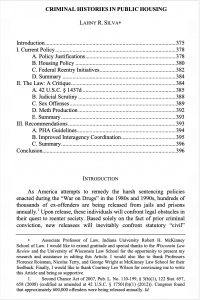Criminal Histories in Public Housing
Lahny R. Silva, 5 Wisconsin Law Review 4
The article discusses that, as America attempts to remedy the harsh sentencing policies enacted during the “War on Drugs” in the 1980s and 1990s, hundreds of thousands of ex-offenders are being released from jails and prisons annually. Upon release, the author contends, these individuals will confront legal obstacles in their quest to reenter society. Based solely on the fact of prior criminal conviction, new releasees will inevitably confront statutory “civil” penalties severely limiting their most basic opportunities for employment, education, and housing. Known as “collateral consequences,” these penalties relegate ex-offenders to the status of second-class citizens by systematically depriving them of individual rights and privileges. Professor Gabriel “Jack” Chin has classified this socioeconomic phenomenon as the “New Civil Death.” This article focuses on one cluster of collateral consequences that deprive those who have paid their debt to society of a basic necessity—affordable housing.
This article adds to the existing reentry scholarship and advocacy by identifying and examining issues in the administration of federal public housing policy and inequities inherent in the current system. More specifically, this article explores federal public housing policies regarding the use of criminal history information in determining the eligibility of applicants seeking admission to federal public housing programming.
